Extreme Poverty
Grow Your Own Sack Garden

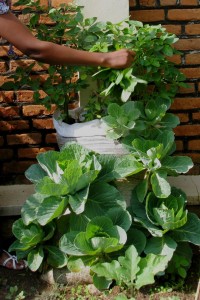
Our staff in Chad have been teaching people living in refugee camps there how to grow sack gardens. It’s a great way to improve a family’s diet by adding fresh vegetables with less water needed than a typical garden.
Since spring is a time many people are thinking about gardening, we thought we’d share these instructions for growing your own sack garden! If you do, please share it with us! We’ll be sure to share how things are growing in Chad, too.
Our agronomists first learned about sack gardens from Manor House Agricultural Centre in Kenya, and we learned more about various container and urban gardening methods at ECHO Global Farm. These instructions have been pulled from Gardens From Health.
Materials needed to grow your own sack garden:
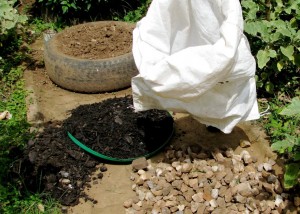
- A burlap or plastic sack (we use discarded food aid sacks, which make perfect sack gardens, especially for symbolic reasons)
- Soil mixed with organic compost
- Rocks for irrigation
- A cylindrical bucket or tin, open on both ends (we use seed tins or vegetable oil tins, but a coffee can would work well too)
Instructions:
| image | text |
|---|---|
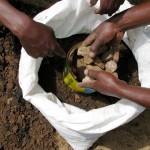 |
1. Fill the bottom of the sack with soil mixed with organic compost. Fill the tin with rocks. This will serve as an irrigation channel. |
| 2. Surround the tin with more soil, and slowly lift it up, so that the rocks remain. | |
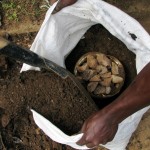 |
3. Fill the tin with more rocks, and surround it again with soil. Repeat this until the sack is filled with a tower of rocks surrounded by soil. |
| 4. Poke holes into the side of the sack an even distance apart. | |
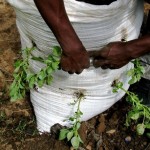 |
5. Transplant seedlings into the sides of the sack. |
| 6. You can try direct seeding beets, carrots or other vegetables or herbs in the top of the sack. | |
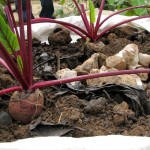 |
7. Enjoy your harvest! |
For more information on how World Concern is improving nutrition in impoverished countries, please visit worldconcern.org/myconcern/hunger